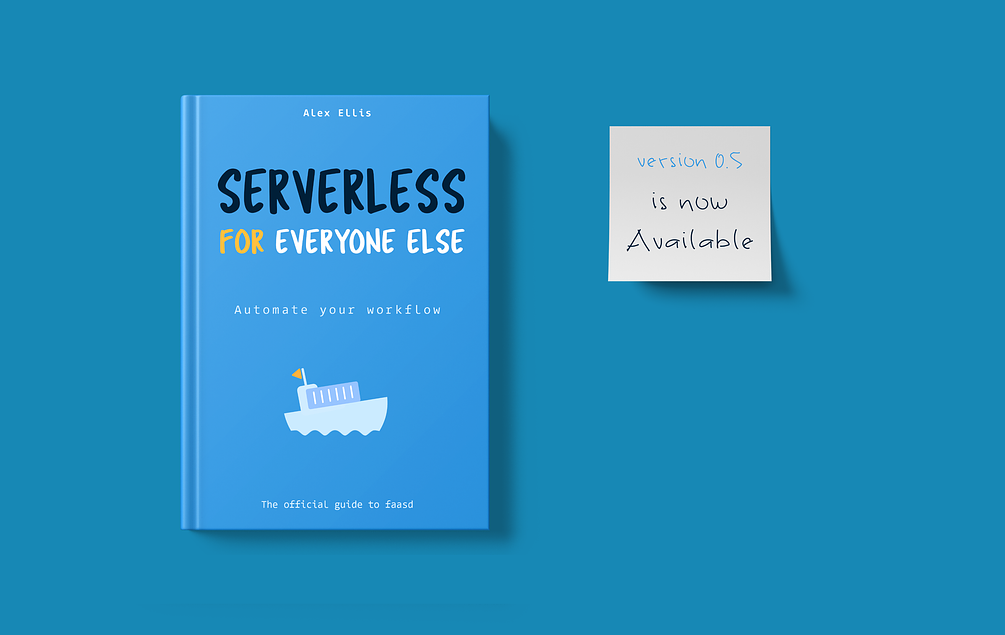We’ll show you how to access any part of the Kubernetes API or a Custom Resource using a ServiceAccount and granular permissions
You’ll learn how you’re already using the Kubernetes API, what an Operator is, and why a Function may be a better fit some of the time. We’ve also included a code-example so you can get going with that today.
Introduction by Alex
If you’re using Kubernetes on a regular basis, then you’re probably already familiar with its API: from Pods to Deployments to Ingress to Secrets, these are all API objects. Most of the time, we don’t think about RESTful operations like GET/POST/DELETE, but we write declarative YAML files like this:
apiVersion: v1
kind: Pod
metadata:
name: nginx
spec:
containers:
- name: nginx
image: nginx:1.14.2
ports:
- containerPort: 80
But under the hood, these objects are brought into Kubernetes not by magic, or a Go binary, but by a REST API just like the ones you may be developing as part of a business application.
Now, working with the Kubernetes API directly can be tedious and complex, especially when it comes to implementing its authentication, so the community built a library in Go called client-go. It’s simply called “Go client for Kubernetes.” on GitHub, which is underselling it somewhat!
With client-go, you can do all the same things you’ve seen in a Helm chart, or in a YAML file.
Here’s a code snippet from a utility I wrote a few weeks ago to make it easier to run a job on Kubernetes and to collect its results:
jobID := uuid.New().String()
parallelism := int32(1)
ctx := context.Background()
jobSpec := &batchv1.Job{
ObjectMeta: metav1.ObjectMeta{
Name: name,
Namespace: namespace,
Labels: map[string]string{
"app": "run-job",
"job-id": jobID,
},
},
Spec: batchv1.JobSpec{
Parallelism: ¶llelism,
BackoffLimit: ¶llelism,
Template: corev1.PodTemplateSpec{
ObjectMeta: metav1.ObjectMeta{
Labels: map[string]string{
"app": "run-job",
"job-id": jobID,
},
Name: name,
Namespace: namespace,
},
Spec: corev1.PodSpec{
RestartPolicy: corev1.RestartPolicyNever,
ServiceAccountName: sa,
Containers: []corev1.Container{
{
Image: image,
Name: name,
ImagePullPolicy: corev1.PullAlways,
Command: command,
Args: args,
},
},
},
},
},
}
See the full source-code on GitHub: alexellis/run-job
So if you squint, you can see that we really have written something very similar to what we’re used to with YAML files, but with code, which means we can write control-loops, iterate over collections of objects, and build custom behaviour.
And when you do all that, you’re looking at what the CoreOS team (RIP) calls an “Operator”.
According to operatorhub.io:
“Operators are a design pattern made public in a 2016 CoreOS blog post. The goal of an Operator is to put operational knowledge into software. Previously this knowledge only resided in the minds of administrators, various combinations of shell scripts or automation software like Ansible. It was outside of your Kubernetes cluster and hard to integrate. With Operators, CoreOS changed that.”
OpenFaaS itself is an operator, and you can view its source code here:
https://github.com/openfaas/faas-netes
One of our sister projects called inlets has an operator that doesn’t just control in-cluster, Kubernetes APIs, but can provision cloud VMs to give you quick access to local services from the Internet:
https://github.com/inlets/inlets-operator
So if Operators are so great, why would you need a function?
Operators are complex beasts requiring frameworks like kube-builder and lots of packaging, Dockerfiles, and ongoing maintenance.
We love them here, but perhaps there’s an option you can reach for, which will solve the problem without all the overheads?
If you already get the value of functions, then you won’t need any convincing.
But here are a few ideas:
- ChatOps - you are running a multi-tenant cluster, someone opens a ticket in ServiceNow and needs a new namespace. You open Slack and type in
/create-namespace teamaand team a gets their namespace, because that chat bot was really and OpenFaaS Function just like the one we’re going to see today - Debugging - Han’s example will show you one of the most underappreciated features of Kubernetes, events. Events are where you go when you’ve already checked Pods logs and don’t know what’s going wrong. Why not access them from a function?
- Garbage collection & maintenance - if you’ve got a bug in a controller and it’s leaving orphaned objects in the cluster, a function could run on a cron schedule to clean these up. It may even be that you delete any objects in staging that are more than 30 days old, but don’t have the time to maintain an operator
- Integration - OpenFaaS has various event connectors for AWS SQS, AWS SNS, NATS, webhooks and Apache Kafka, rather than adding this code into your operators, you could write a function and have it get triggered by an event
I’ll turn it over to Han, who’s going to show you how to create a function using the Go template in OpenFaaS, to get the events from a namespace and return them from a function.
Write a function to find the events in a namespace
Pods can be given a Service Account with its own set of Roles and permissions so it can access the Kubernetes API.
Here is a ServiceAccount and ClusterRole that can be used to list events for different namespaces. You could also restrict this to a Role and RoleBinding, if you only needed to access one namespace.
# SA
apiVersion: v1
kind: ServiceAccount
metadata:
name: fn-events
namespace: openfaas-fn
---
# ClusterRole
apiVersion: rbac.authorization.k8s.io/v1
kind: ClusterRole
metadata:
labels:
app: openfaas
name: fn-events
rules:
- apiGroups: [""]
resources: ["events"]
verbs:
- list
# ClusterRoleBinding
---
apiVersion: rbac.authorization.k8s.io/v1
kind: ClusterRoleBinding
metadata:
labels:
app: openfaas
name: fn-events
roleRef:
apiGroup: rbac.authorization.k8s.io
kind: ClusterRole
name: fn-events
subjects:
- kind: ServiceAccount
name: fn-events
namespace: openfaas-fn
---
Functions can only assume a ServiceAccount in the namespace in which they are deployed. The fn-events ServiceAccount is created in the openfaas-fn namespace. This is the default namespace used for OpenFaaS functions.
Learn more about RBAC Authorization and Service Accounts in the Kubernetes documentation.
Now let’s create a new function named get-events using the golang-middleware template
export OPENFAAS_URL="docker.io/username"
faas-cli template store pull golang-middleware
faas-cli new get-events --lang golang-middleware
You can assign a ServiceAccount to a function by adding the annotation com.openfaas.serviceaccount in the functions stack.yaml file.
functions:
get-events:
lang: golang-middleware
handler: ./get-events
image: welteki2/get-events:0.1.1
annotations:
com.openfaas.serviceaccount: fn-events
If you want to learn how to build functions with Go, check out Alex’s book (Premium Edition) for lots of examples.
We will be using the Kubernetes client package for Go to access data and resources in the cluster. The function first creates a new clientset with an in-cluster configuration. The clientset is then used to list the events for a specific namespace.
The namespace can be passed in as the request body. If no namespace is passed in we list the events for the openfaas-fn namespace.
Add the required dependencies for the function:
cd get-events
go get "k8s.io/apimachinery/pkg/apis/meta/v1"
go get "k8s.io/client-go/kubernetes"
Edit the function handler ./get-events/handler.go:
package function
import (
"bytes"
"context"
"fmt"
"io"
"net/http"
"text/tabwriter"
"time"
metav1 "k8s.io/apimachinery/pkg/apis/meta/v1"
"k8s.io/client-go/kubernetes"
"k8s.io/client-go/rest"
)
var clientset *kubernetes.Clientset
func Handle(w http.ResponseWriter, r *http.Request) {
if clientset == nil {
cs, err := getClientset()
if err != nil {
w.WriteHeader(http.StatusInternalServerError)
w.Write([]byte(fmt.Sprintf("failed to get clientset: %s", err)))
return
}
clientset = cs
}
var namespace string
if r.Body != nil {
defer r.Body.Close()
body, _ := io.ReadAll(r.Body)
namespace = string(body)
}
if len(namespace) == 0 {
namespace = "openfaas-fn"
}
ctx := context.Background()
events, err := clientset.CoreV1().Events(namespace).List(ctx, metav1.ListOptions{})
if err != nil {
w.WriteHeader(http.StatusInternalServerError)
w.Write([]byte(fmt.Sprintf("failed to list events: %s", err)))
return
}
var b bytes.Buffer
tabw := tabwriter.NewWriter(&b, 0, 3, 1, ' ', 0)
fmt.Fprintf(tabw, "LAST SEEN\tTYPE\tREASON\tOBJECT\tMESSAGE\n")
for _, e := range events.Items {
object := fmt.Sprintf("%s/%s", e.InvolvedObject.Kind, e.InvolvedObject.Name)
lastSeen := e.LastTimestamp.Format(time.RFC822)
fmt.Fprintf(tabw, "%s\t%s\t%s\t%s\t%s\n", lastSeen, e.Type, e.Reason, object, e.Message)
}
tabw.Flush()
w.WriteHeader(http.StatusOK)
w.Write(b.Bytes())
}
func getClientset() (*kubernetes.Clientset, error) {
config, err := rest.InClusterConfig()
if err != nil {
return nil, fmt.Errorf("error building kubeconfig: %s", err)
}
clientset, err := kubernetes.NewForConfig(config)
if err != nil {
return nil, err
}
return clientset, nil
}
Deploy the function with faas-cli up -f get-events.yml
Then invoke it with curl. This should return a formatted list of events for a namespace.
curl -i http://127.0.0.1:8080/function/get-events
HTTP/1.1 200 OK
Content-Length: 798
Content-Type: text/plain; charset=utf-8
Date: Thu, 13 Oct 2022 13:41:09 GMT
X-Call-Id: b1af2c1b-bd06-4b9c-969a-a7d8e065a2e8
X-Duration-Seconds: 0.005199
X-Start-Time: 1665668469270352257
LAST SEEN TYPE REASON OBJECT MESSAGE
13 Oct 22 13:40 UTC Normal Synced Function/bcrypt Function synced successfully
13 Oct 22 13:40 UTC Normal Synced Function/cows Function synced successfully
13 Oct 22 13:40 UTC Normal Synced Function/delay-sleep Function synced successfully
13 Oct 22 13:40 UTC Normal Synced Function/health Function synced successfully
13 Oct 22 13:40 UTC Normal Synced Function/list-of-namespaces Function synced successfully
13 Oct 22 13:40 UTC Normal Synced Function/sleep Function synced successfully
13 Oct 22 13:40 UTC Normal Synced Function/ready Function synced successfully
13 Oct 22 13:40 UTC Normal Synced Function/get-events Function synced successfully
Trigger workloads on a schedule
Depending on the workload you are running in your function you might want to trigger it on a timed-basis. OpenFaaS has support for this through the cron event-connector.
You can deploy the cron-connector with arkade.
arkade install cron-connector
Two annotation are required to trigger the function, a topic of cron-function and a schedule using a valid Cron expression.
Add these annotations to the stack.yaml:
functions:
get-events:
lang: golang-middleware
handler: ./get-events
image: welteki2/get-events:0.1.1
annotations:
com.openfaas.serviceaccount: fn-events
topic: cron-function
schedule: "* */1 * * *"
This will trigger the function every hour.
Wrapping up
It is possible to access the Kubernetes API form within your functions. We walked through a short example where we create a function to list events for different namespaces. What you choose to do with your cluster from your functions code is entirely up to you. You could create a function to:
- Do any kind of reconciliation like cleaning up orphaned objects or applying a certain label to workloads
- Build a self-service integration with Slack, where a chatbot can provision namespaces for teams
- Run diagnostics against your cluster. We did something like this with the OpenFaaS config-checker
Take a look at what you are using the Kubernetes API for. Maybe you could benefit from running some of that code as a function.
What about authentication?
Once you’ve given your function a Service Account, if it’s read-only and the OpenFaaS gateway is behind a firewall, the chances for abuse are low.
But if your Service Account can write to resources in the cluster, then you need to enable some form of authentication on the function. An API token might be a good starting point, especially if this is going to be called from another server or microservice in your system.
We are interested to hear what workloads you would run using this approach. Let us know by tweeting to @openfaas.
You may also like:
Co-authored by:

